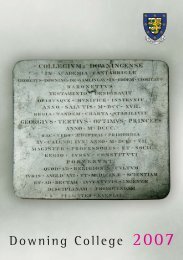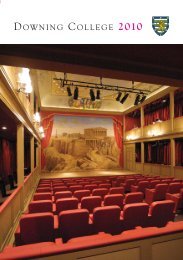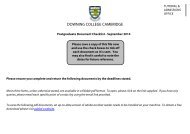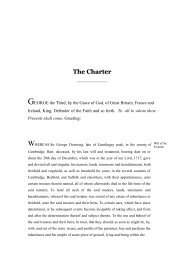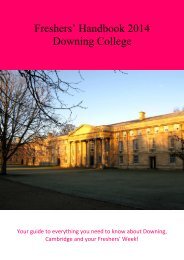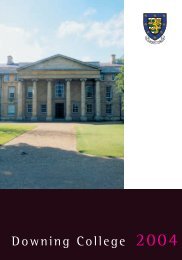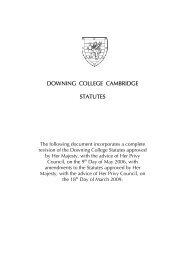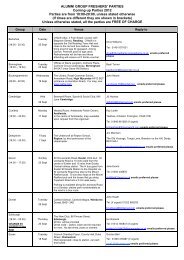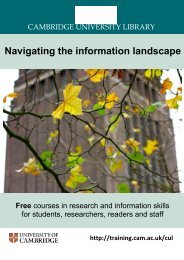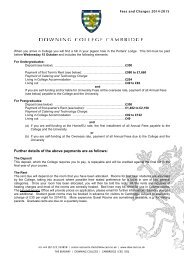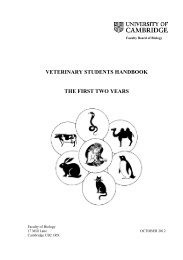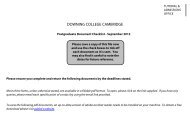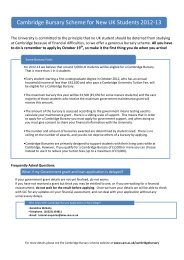downing text 2012_Layout 1 - Downing College - University of ...
downing text 2012_Layout 1 - Downing College - University of ...
downing text 2012_Layout 1 - Downing College - University of ...
- No tags were found...
Create successful ePaper yourself
Turn your PDF publications into a flip-book with our unique Google optimized e-Paper software.
DOWNING COLLEGE 2011–<strong>2012</strong>Letters from David to his Tutor Bill Cuttle provide impressions <strong>of</strong> his timeas a soldier. But he fortunately saw fit to depict his wartime experiences inanother ‘Paul Grimmer’ novel called Flesh Wounds. It was not published until1966, by which time it seemed appropriate to David that the story should betold. There are those who rate the book as one <strong>of</strong> the most sensitive and crediblenovels to emerge from the Second World War. As the title suggests, David waswounded early in the Normandy Campaign; he was evacuated back to Britain,but returned to active service in time to be involved in the Ardennes Campaignand the Rhine Crossing. In a later letter to Cuttle from July 1945, Daviddescribed the boredom <strong>of</strong> ‘policing 434,000 ex-Wehrmacht’, passing the timein ‘serious reading’, but finding it ‘very difficult to reconcile Milton’s prose orElizabethan plays with the conversation at a Regimental dinner.’David returned to <strong>Downing</strong> in 1945 and graduated in 1947. Leavis’supervision reports noted the improved impression his pupil made on him afterhis return from the War, but observed with apparent disquiet his increasedinvolvement in politics. (David never concealed his early membership <strong>of</strong> theCommunist Party; like many others, he quit after the Soviet suppression <strong>of</strong> theHungarian Uprising in 1956). Letters to Cuttle and Leavis requestingtestimonials suggest David’s restlessness in the post-War years. He workedinitially for Edgell Rickword, literary critic and poet <strong>of</strong> the Great War, asassistant editor <strong>of</strong> Rickword’s magazine, Our Time. After spells with the Bureau<strong>of</strong> Current Affairs and the Workers’ Educational Association, he went in 1954as a Tutor to Bassingbourn Village <strong>College</strong>. This proved the basis for the next,decisive phase <strong>of</strong> David’s life as teacher and educationalist.The Village <strong>College</strong> movement was intended by its founder, Henry Morris,to be comprehensive in the broadest sense, providing a focus for the whole<strong>of</strong> the local community. Fittingly, David’s experiences at Bassingbournsupplied the material and inspiration for pathbreaking books on the teaching<strong>of</strong> English, beginning with English for Maturity (1961). In English for the Rejected(1964), he memorably demonstrated that children sidelined as failures (‘DStreamers’) could both benefit from and contribute towards the experience <strong>of</strong>English teaching. Along with The Exploring Word (1967) and The Secret Places(1972), these books established David as one <strong>of</strong> the most influential writers formore than a generation <strong>of</strong> teachers. Their pupils were directly influencedthrough David’s best-selling anthologies: Thieves and Angels (1962), People andDiamonds (1962) and Iron, Honey, Gold: the uses <strong>of</strong> verse (1965). It remains acommon experience, on mentioning David’s name to those <strong>of</strong> a certain age, toreceive the response: ‘You mean the David Holbrook?’ His contribution toteaching and learning is eloquently set out by his pupil Tom Deveson in theGuardian obituary (1.9.11).194



